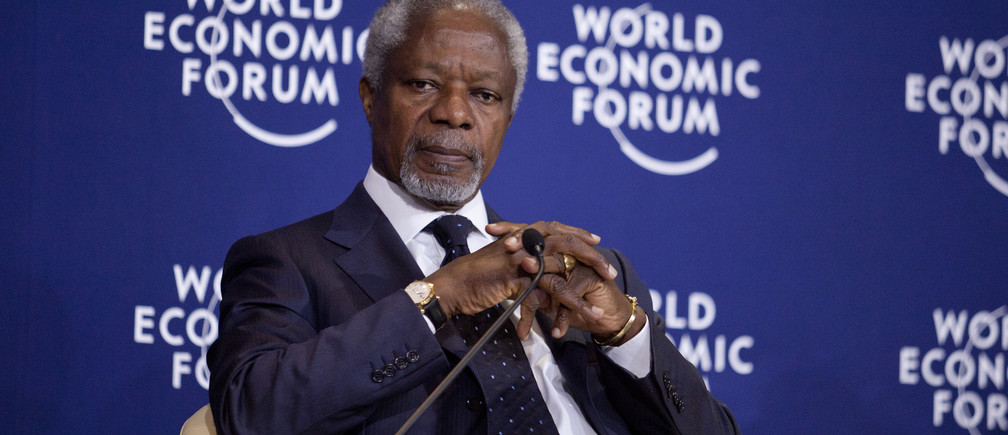Remembering Kofi Annan

Former United Nations Secretary-General Kofi Annan has died at the age of 80.
Image: World Economic Forum
Kofi Annan, the former United Nations Secretary-General and Nobel Peace Prize laureate, has died at the age of 80.
The Kofi Annan Foundation, based in Geneva, Switzerland, announced his peaceful death with “immense sadness” after a short illness.
“Kofi Annan was a global statesman and a deeply committed internationalist who fought throughout his life for a fairer and more peaceful world. During his distinguished career and leadership of the United Nations he was an ardent champion of peace, sustainable development, human rights and the rule of law,” his foundation said in a statement.
The Ghanaian was the seventh Secretary-General and served for two terms between 1997 and 2006. He was awarded the Nobel Peace Prize for his humanitarian work jointly with the UN in 2001.
Klaus Schwab, Founder and Executive Chairman of the World Economic Forum, said: “Kofi Annan was such a great supporter and the Forum would not have achieved its present status without his engagement, first as Secretary-General of the UN, and later as member of the Board of Trustees. I will recall him above all as personal friend and mentor. His spirit will live on in our actions. Our thoughts and condolences are with his family.”
The first black African to lead the United Nations, Annan was born in Kumasi, Ghana, in 1938, and entered the UN system in 1962 with a position at the World Health Organization in Geneva.
António Guterres, the current UN Secretary-General and who Annan had appointed to lead its refugee agency, said: “In many ways, Kofi Annan was the United Nations. He rose through the ranks to lead the organisation into the new millennium with matchless dignity and determination.”
Accept our marketing cookies to access this content.
These cookies are currently disabled in your browser.
After stepping down from the UN, Annan remained deeply committed to African development. As well as the chairmanship of his own foundation, Annan also served as chair of The Elders, a group founded by Nelson Mandela, as well as the African Progress Panel.
“Kofi Annan was a son of Ghana and felt a special responsibility towards Africa,” his foundation's statement said.
During his long association with the World Economic Forum, Annan spoke passionately about the urgent need to address key challenges such as income inequality, climate change and global healthcare.
In a speech at the World Economic Forum's Annual Meeting in Davos in 1999, Annan announced the United Nations Global Compact, a voluntary initiative designed to help fashion a more humane world by enlisting business leaders to follow a set of 10 principles concerning human rights, fair labour practices, the environment and corruption.
“We have to choose between a global market driven only by calculations of short-term profit, and one which has a human face,” he said. “Between a world which condemns a quarter of the human race to starvation and squalor, and one which offers everyone at least a chance of prosperity, in a healthy environment. Between a selfish free-for-all in which we ignore the fate of the losers, and a future in which the strong and successful accept their responsibilities, showing global vision and leadership.”
Two years later, Annan warned world leaders at Davos that unrestricted and unregulated globalization could lead to an unmitigated disaster worldwide.
“My friends, the simple fact of the matter is this: if we cannot make globalization work for all, then it will work for none,” he said.
More recently, ahead of the Annual Meeting in 2015, Annan issued an impassioned plea for world leaders gathering in Davos to help end the Ebola disaster, halt climate change, rid our world of hunger and begin the difficult process of healing deep divisions in our societies.
Writing for the World Economic Forum's blog, Agenda, Annan also called for a humane solution to the global migration crisis.
“It is time to accept the reality that, like the waves on the seas that many of the migrants traverse, the ebb and flow of human movement cannot be stopped. That is why the international community must manage migration with understanding and compassion,” he wrote.
Accept our marketing cookies to access this content.
These cookies are currently disabled in your browser.
Don't miss any update on this topic
Create a free account and access your personalized content collection with our latest publications and analyses.
License and Republishing
World Economic Forum articles may be republished in accordance with the Creative Commons Attribution-NonCommercial-NoDerivatives 4.0 International Public License, and in accordance with our Terms of Use.
The views expressed in this article are those of the author alone and not the World Economic Forum.
Forum Stories newsletter
Bringing you weekly curated insights and analysis on the global issues that matter.